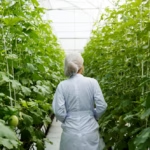Organic farming offers several benefits for soil health and food safety in South Africa. Let’s explore these benefits in more detail:
- Soil Health: a. Enhanced Soil Fertility: Organic farming relies on natural methods such as crop rotation, composting, and the use of organic fertilizers like manure and compost. These practices enrich the soil with organic matter, nutrients, and beneficial microorganisms, promoting soil fertility. b. Improved Soil Structure: Organic farming practices help maintain soil structure, preventing erosion and enhancing water infiltration. Organic matter improves the soil’s ability to retain moisture, reducing the risk of drought and improving overall soil health. c. Biodiversity Conservation: Organic farming encourages biodiversity by avoiding the use of synthetic pesticides and promoting natural pest control methods. This helps maintain a balanced ecosystem within the soil, fostering the presence of beneficial organisms like earthworms and soil bacteria. d. Soil Conservation: By avoiding the use of synthetic chemicals, organic farming minimizes soil degradation and pollution. The absence of harmful pesticides and chemical fertilizers prevents the accumulation of toxins in the soil, leading to healthier, more sustainable farming practices.
- Food Safety: a. Reduced Chemical Residues: Organic farming prohibits the use of synthetic pesticides and genetically modified organisms (GMOs). As a result, organic food products have significantly lower levels of chemical residues, making them safer for consumption. b. Healthier Nutrient Profiles: Organic farming often prioritizes soil health, which, in turn, promotes the growth of nutritionally rich crops. Studies have shown that organic fruits, vegetables, and grains tend to have higher levels of certain vitamins, minerals, and antioxidants compared to conventionally grown counterparts. c. No Synthetic Hormones or Antibiotics: Organic livestock farming prohibits the use of growth hormones and antibiotics routinely given to animals in conventional farming. This ensures that organic meat, poultry, and dairy products are free from these additives, reducing the risk of antibiotic resistance and potential health concerns. d. Stringent Certification Standards: Organic farming in South Africa follows strict certification standards, ensuring that organic products meet specific criteria and are regularly inspected. This certification process provides consumers with confidence in the authenticity and safety of organic food products.
- Environmental Benefits: a. Reduced Water Pollution: Organic farming practices minimize the use of synthetic fertilizers and pesticides, preventing water pollution caused by runoff. This helps protect water sources, including rivers, lakes, and groundwater reserves. b. Conservation of Biodiversity: By avoiding the use of synthetic chemicals, organic farming supports biodiversity by providing habitats for beneficial insects, birds, and other wildlife. This promotes a balanced ecosystem and contributes to the conservation of natural resources. c. Climate Change Mitigation: Organic farming practices, such as composting and carbon sequestration in the soil, help mitigate climate change. Organic soils have the potential to store more carbon, reducing greenhouse gas emissions and enhancing the resilience of agricultural systems to extreme weather events.
Overall, organic farming in South Africa offers significant benefits for soil health, food safety, and the environment. By adopting organic practices, farmers can contribute to sustainable agriculture, protect natural resources, and provide consumers with healthier food options.









